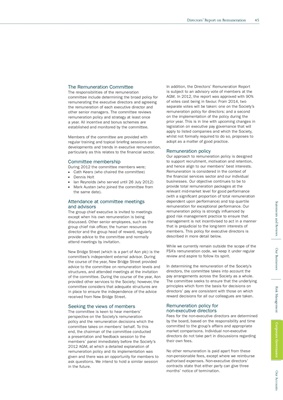
Directors’ Report on Remuneration 45
The Remuneration Committee In addition, the Directors’ Remuneration Report
The responsibilities of the remuneration is subject to an advisory vote of members at the
committee include determining the broad policy for AGM. In 2012, the report was approved with 90%
remunerating the executive directors and agreeing of votes cast being in favour. From 2014, two
the remuneration of each executive director and separate votes will be taken: one on the Society’s
other senior managers. The committee reviews remuneration policy for directors; and a second
remuneration policy and strategy at least once on the implementation of the policy during the
a year. All incentive and bonus schemes are prior year. This is in line with upcoming changes in
established and monitored by the committee. legislation on executive pay governance that will
apply to listed companies and which the Society,
Members of the committee are provided with whilst not formally required to do so, proposes to
regular training and topical briefing sessions on adopt as a matter of good practice.
developments and trends in executive remuneration,
particularly as this relates to the financial sector. Remuneration policy
Our approach to remuneration policy is designed
Committee membership to support recruitment, motivation and retention,
During 2012 the committee members were; and hence align to our members’ best interests.
l Cath Keers (who chaired the committee) Remuneration is considered in the context of
l Dennis Holt the financial services sector and our individual
l Ian Reynolds (who served until 26 July 2012) businesses. Our objective continues to be to
l Mark Austen (who joined the committee from provide total remuneration packages at the
the same date). relevant mid-market level for good performance
(with a significant proportion of total remuneration
Attendance at committee meetings dependent upon performance) and top quartile
Statements and Reviews
and advisors remuneration for exceptional performance. Our
The group chief executive is invited to meetings remuneration policy is strongly influenced by
except when his own remuneration is being good risk management practice to ensure that
discussed. Other senior employees, such as the management is not incentivised to act in a manner
group chief risk officer, the human resources that is prejudicial to the long-term interests of
director and the group head of reward, regularly members. This policy for executive directors is
provide advice to the committee and normally described in more detail below.
attend meetings by invitation.
While we currently remain outside the scope of the
Our Businesses
New Bridge Street (which is a part of Aon plc) is the FSA’s remuneration code, we keep it under regular
committee’s independent external advisor. During review and aspire to follow its spirit.
the course of the year, New Bridge Street provided
advice to the committee on remuneration levels and In determining the remuneration of the Society’s
structures, and attended meetings at the invitation directors, the committee takes into account the
of the committee. During the course of the year, Aon pay arrangements across the Society as a whole.
provided other services to the Society; however, the The committee seeks to ensure that the underlying
committee considers that adequate structures are principles which form the basis for decisions on
Risk Management
in place to ensure the independence of the advice directors’ pay are consistent with those on which
received from New Bridge Street. reward decisions for all our colleagues are taken.
Seeking the views of members Remuneration policy for
The committee is keen to hear members’ non-executive directors
perspective on the Society’s remuneration Fees for the non-executive directors are determined
policy and the remuneration decisions which the by the board, based on the responsibility and time
Corporate Governance
committee takes on members’ behalf. To this committed to the group’s affairs and appropriate
end, the chairman of the committee conducted market comparisons. Individual non-executive
a presentation and feedback session to the directors do not take part in discussions regarding
members’ panel immediately before the Society’s their own fees.
2012 AGM, at which a detailed explanation of
remuneration policy and its implementation was No other remuneration is paid apart from these
given and there was an opportunity for members to non-pensionable fees, except where we reimburse
ask questions. We intend to hold a similar session authorised expenses. Non-executive directors’
in the future. contracts state that either party can give three
months’ notice of termination.
Our Accounts